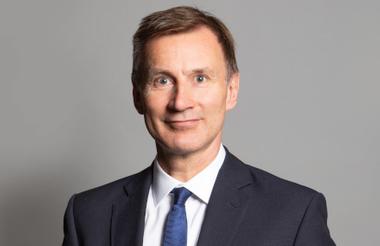Civil society organisations have reacted to Jeremy Hunt's latest spring budget, with several groups lamenting a lack of measures to help the charity sector.
The chancellor today outlined the government's tax and spending plans, including a further cut to National Insurance, an increase in the VAT registration threshold, and protections for charities claiming gift aid.
Hunt announced more funding for medical research charities, the National Theatre and more than £1bn in additional tax relief for creative industries over the next five years.
Today could be the last budget before the next general election and on average Labour now has about a 20 percentage point lead over the Conservatives.
Key announcements for charity sector
The budget says the government will amend gift aid legislation due to implications of the digital markets, competition and consumers bill.
Sector experts previously warned that the bill could deprive membership charities of their current ability to claim gift aid on members’ subscriptions.
But the budget says the government will amend existing gift aid legislation by statutory instrument so that charities can continue to claim it while complying with the bill, when it comes into force.
He pledged £45m through the Medical Research Charities Early Career Researchers Support Fund into medical research into diseases such as dementia, cancer and epilepsy, including £3m for Cancer Research UK (CRUK).
Hunt announced cuts to National Insurance for workers by another 2p in the pound, after it also fell by 2p in last year's autumn statement.
This will mean the main rate falling from 10% to 8%, he said, which could save the average worker around £450 a year.
Self-employed National Insurance will drop from 8% to 6%, while Hunt said the long term plan would be to continue to cut National Insurance contributions.
Hunt added for some people the “best way to resolve debts is through a debt relief order but getting one costs £90, which can deter the very people who need them the most”.
The chancellor said he had listened to Citizens Advice and abolished the £90 debt relief order charge.
He also announced an increase to the repayment period for new loans from 12 months to 24 months.
The Household Support Fund, which allows local councils to help families via food banks, warm spaces and food vouchers, will be extended beyond 31 March. It will continue for six months.
Hunt also said he had been listening to the Joseph Rowntree Foundation and the Trussell Trust and he has decided “with the battle against inflation still not over - now is not the time to stop the targeted help it offers”.
Fuel duty will remain at its current rate and be frozen for the next 12 months, and the Chancellor will also extend a temporary 5p cut on fuel duty which was due to end this month.
Hunt also awarded funding to the National Theatre, £26m, to improve in stages.
The chancellor also announced an additional £2.5bn for the NHS in the coming year, and said the investment needed to modernise NHS IT systems will cost £3.4bn - though will unlock £35bn of savings.
Hunt pledged £105m over the next four years to build 15 new special free schools.
He also announced changes to child benefits, to a household system, which is to be introduced by April 2026.
The changes will include, from this April, a threshold rise to £60,000 (from £50,000). Hunt will raise the top of the taper at which it is withdrawn to £80,000.
Hunt announced that the VAT registration threshold would increase from £85,000 to £90,000, which could mean some charities pay less tax and do not have to comply with VAT regulations.
NCVO: Budget ‘most notable for what it didn’t include’
Sarah Vibert, chief executive of NCVO, said the budget presented a “missed opportunity” to “empower the voluntary sector as a vital partner for government in the delivery of public services”.
“Following a decade of cuts, a pandemic, and the ongoing cost of living crisis, the voluntary sector is doing its best to continue to meet high and growing demand with ever-fewer resources,” she said.
“But our best may not be enough for the people who rely on our support. We’ve been clear that we need bold action from government.
“We welcome some of the chancellor’s announcements – including increasing the child benefit threshold and the short-term extension of the Household Support Fund – but today’s budget was most notable for what it didn’t include.
“Its measures will not improve things for most people and communities seeking support from charities. They will continue to pay the price of government inaction.”
CTG: ‘Very few measures to help the sector’
The Charity Tax Group (CTG) said there were “very few measures” in the budget to help the charity sector.
CTG welcomed the increase in the VAT registration threshold, which it said “will help smaller charities to avoid being drawn into the VAT net”.
It said extended relief for museums and galleries and £5m to help village halls would help specific parts of the charity sector.
CTG welcomed the funding for medical research charities and amendments to the digital markets, competition and consumers bill to ensure charities can continue to claim gift aid.
However, it said the chancellor “missed a great opportunity” to help charities with the huge amount of irrecoverable VAT that they pay each year.
CTG chair Richard Bray said: “Recent reports have demonstrated that charities are buckling under the strain of supporting key public services but are not, in turn, getting the support that they need – we urge the government to tackle this long-standing problem.”
ACEVO: Key issues ‘remain firmly unaddressed’
Jane Ide, chief executive of ACEVO, said the budget failed to address some key issues.
“The extension of the Household Support Fund by a limited six months falls far short of what many in our sector have advocated for and will mean more calls on our sector to provide much needed support,” she said.
“The cuts to National Insurance were widely trailed, which may help some workers in the short term; but the underlying pressures on public services, and in particular funding for local authorities, remain firmly unaddressed.
“Services for those who are most disadvantaged, in particular, will continue to be a major concern for our sector. “
NPC: ‘The sector needs long-term stability’
NPC’s head of policy and external affairs Leah Davis said challenges facing charities such as increased demand and rising costs “will hardly be eased by today’s announcement of further cuts in National Insurance”.
She said some measures including changes to the Household Support Fund and increased funding for medical research charities were welcome.
“But to help the people we serve, the sector needed to hear measures to really tackle both poverty and the growing crisis in local government finances,” she said.
“We also needed to hear about steps to address the underfunding of government contracts that have led to charities subsiding the state by £2.4bn each year.
“Ultimately, the sector needs long-term stability in government spending plans and the economy. It now faces the uncertainty of an election with the looming threat of further cuts to many public services in future years."
PBE: ‘Charities will continue to struggle’
Matt Whittaker, CEO of Pro Bono Economics said a lack of measures to support those in the greatest need “is likely to mean demand on the nation’s charities continuing to climb”.
“The charity sector is just beginning to emerge from the pandemic and cost of living crisis, and capacity remains tight – with a third of charities expecting to be unable to meet demand for their services this quarter.
“Indications are that charity income will gradually improve over the next year, but that recovery is fragile.
Whittaker said a lack of measures to address a “crisis” in local government funding was also bad for charities.
“People with the lowest wellbeing and the charities that support them will continue to struggle as long as this crisis remains unaddressed,” he said.
Locality: ‘Local people should not bear the brunt’
Locality’s chief executive, Tony Armstrong, said: “With electoral politics taking centre stage, this budget has ignored the elephant in the room.
“Mounting pressure on councils to cut services and sell assets just means local people are paying the cost. From Birmingham to Bristol, Nottingham to Thurrock, council cuts mean that charities and community organisations are struggling to keep vital local spaces and services alive.
“It's clear that a more sustainable long-term funding settlement for local government is needed. On that the Chancellor remained silent. The Government needs to act now to stop the loss of key services and spaces which have been vital in holding communities together. Local people should not bear the brunt of council's financial problems.
“But ultimately, we have to move away from short term funding crises to create a longer term shift of power. That’s why in our manifesto we’re calling for radical reforms that put power firmly in community hands. That includes decision making powers for local people so that communities themselves can take charge of the things which are important to them.”
DSC: An ‘electioneering budget’
Jay Kennedy, director of policy and research at DSC, wrote in a blog: “This electioneering budget will likely ramp up the speculation about the timing of the General Election.”
It reads: “There’s little sign of substantial policy change at Westminster which could alleviate current conditions and multiple social crises. Nevertheless, charities must keep making their case and engaging with the political system through the election year, so they can influence what comes next.”
He added: “Despite the campaigning context, there were some themes and initiatives that charity leaders and trustees will want to take note of.”
Other charity sector responses
Several other charities welcomed the six-month extension to the Household Support Fund but said it fell short of an extra two years that they had been seeking.
Richard Lane, chief client officer at StepChange Debt Charity, said: “It’s encouraging to see a six-month extension to the Household Support Fund announced today, but it’s questionable how much things will improve in that time, especially considering two in five people are currently struggling to keep up with household bills and credit commitments.”
He added: “We are particularly pleased to see the announcement that the application fee for debt relief orders will be scrapped and this will remove a real barrier to those seeking support with problem debt. When already facing financial hardship, fees to access solutions can be prohibitive in getting back on track and rebuilding financial security.”
Christian Aid chief of UK advocacy Sophie Powell said: “This budget demonstrates a poverty of ideas. The chancellor has made a deliberate choice to tie the government’s own hands rather than mobilise the resources needed to address the spiralling, and inter-connected, crises of inequality and climate change.
“He should have taxed the wealthiest and the biggest polluters to fund the UK’s fair share of international climate finance. He should have agreed to cancel debts for the poorest countries. That is the ambition we so urgently need, not the same old pretence of there being no other way.”
Oxfam’s domestic poverty lead Silvia Galandini said: “This budget is another missed opportunity to take the ambitious action needed to tackle poverty and narrow the gulf between the richest and the rest.
“Ending non-dom tax status and a temporary extension of the oil and gas windfall tax, and small amounts of extra money for childcare and some people receiving benefits are welcome but basic common sense.
“They do not go nearly far enough to create an economy that works for us all and not just for a small few.
“A cut to National Insurance will largely benefit the highest earners while doing little to support those at the sharp end of the cost-of-living crisis.
“It will inevitably be paid for with further devastating cuts to public services – an act that will hurt everyone but especially those on low-incomes, and risks pushing more people into poverty and hardship."
Independent Age chief executive Joanna Elson said: “Today’s budget was a missed opportunity to help those in later life already living in financial hardship and address the incoming pensioner poverty surge.
“Cutting National Insurance won’t help the more than two million older people living in poverty, or the many more living with precarious finances struggling to make ends meet. Transformative change is needed to improve their lives.
“Bills are still astronomically high, and our helpline hears daily from older people rationing themselves to just one meal a day and washing in cold water to save energy.”
Social care charity Revitalise’s director of external affairs Rebecca Young said: “The current situation, as it stands, means carers are forced to breaking point before respite is offered.
“It is essential that respite services are fully funded and protected. It is deeply concerning that successive governments have failed to address the enormous deficit in supply over demand in the social care sector and how we go about funding these services.”
Centrepoint head of policy research and campaigns Alicia Walker said: “The level of investment we’ve seen in homelessness and rough sleeping has been significant, as it has with the Household Support Fund, but these are policies that play around the edges of a crisis rather than tackling it systemically and head on.
“The upshot is hundreds of thousands of people, many of them young people who should be looking ahead to the rest of their lives, find themselves trapped in a cycle of homelessness and poverty, with little hope of support from a government that today seems to have forgotten them.”
Mel Merritt, head of policy and campaigns at the National Autistic Society, said: “The chancellor’s spring budget failed to address the major issues affecting autistic people.
“We welcome the announcements to extend the Household Support Fund, fully fund the NHS productivity plan and to invest £105m pounds for 15 new special free schools, yet there was nothing that would ultimately address the key issues that autistic people in the UK face.”
Related Articles












